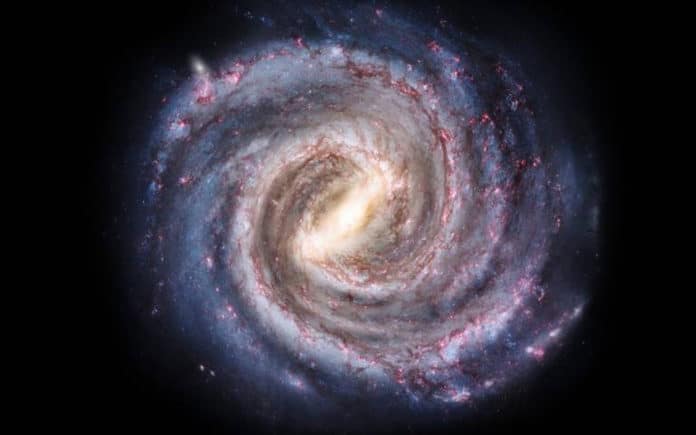Galaxy models have long anticipated that galactic bars slowed down by losing the angular momentum to their proposed dark haloes. This prediction was made almost 30 years ago, but astrophysicists have measured it for the first time.
It was found that the spin of the Milky Way’s galactic bar, which is made up of billions of clustered stars, has slowed by about a quarter since its formation. According to scientists, the slowdown gives insight into the nature of dark matter, which acts like a counterweight slowing the spin.
In this study, scientists from UCL and the University of Oxford used data from the Gaia space telescope of a large group of stars, the Hercules stream. The stream is in resonance with the bar. Moreover, the stars are gravitationally trapped by the spinning bar.
If the bar’s spin slows down, these stars would be expected to move further out in the galaxy, keeping their orbital period matched to the bar’s spin.
Their stream analysis suggests that the stars carry a chemical fingerprint, i.e., they are enriched with heavier elements. Furthermore, heavier elements in their composition indicate that the stars have traveled away from the galactic center, where stars and star-forming gas are about ten times rich in metals compared to the outer galaxy.
Using this data, the team inferred that the bar – made up of billions of stars and trillions of solar masses – had slowed down its spin by at least 24% since it first formed.
Co-author Dr. Ralph Schoenrich (UCL Physics & Astronomy) said: “Astrophysicists have long suspected that the spinning bar at the center of our milky way galaxy is slowing down, but we have found the first evidence of this happening.”
“The counterweight slowing this spin must be dark matter. Unfortunately, until now, we have only been able to infer dark matter by mapping the gravitational potential of galaxies and subtracting the contribution from visible matter.”
“Our research provides a new type of measurement of dark matter – not of its gravitational energy, but of its inertial mass (the dynamical response), which slows the bar’s spin.”
Co-author and Ph.D. student Rimpei Chiba of the University of Oxford said: “Our finding offers a fascinating perspective for constraining the nature of dark matter, as different models will change this inertial pull on the galactic bar.”
“Our finding also poses a major problem for alternative gravity theories – as they lack dark matter in the halo, they predict no, or significantly too little slowing of the bar.”
The research received support from the Royal Society, the Takenaka Scholarship Foundation, and the Science and Technology Facilities Council (STFC).
Journal Reference:
- Rimpei Chiba et al. Tree-ring structure of Galactic bar resonance. DOI: 10.1093/mnras/stab1094
